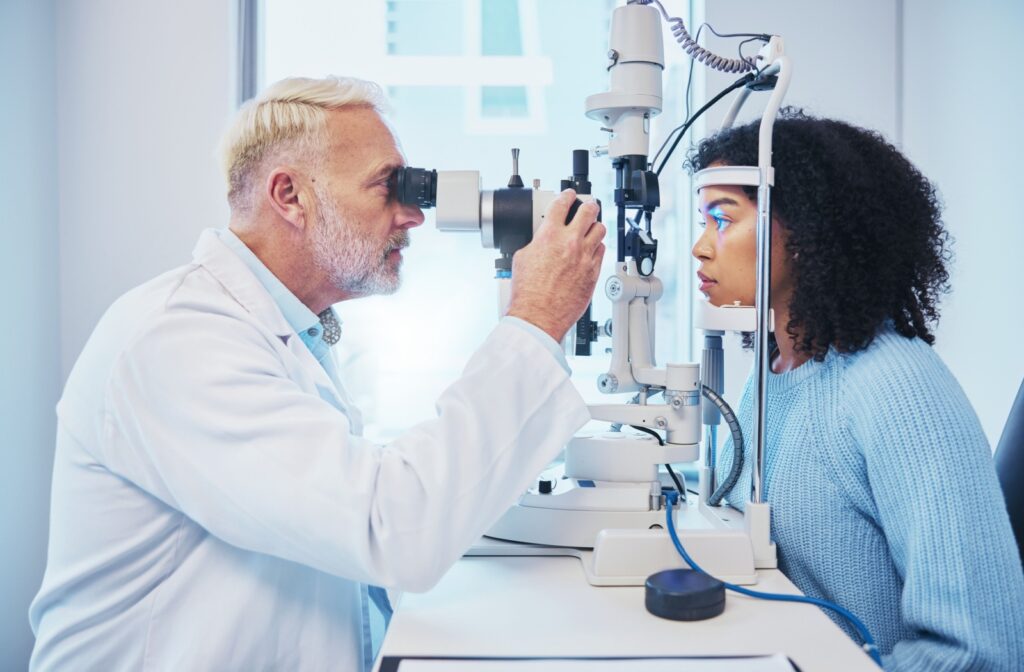If you’ve been dealing with dry, irritated eyes or blurry vision, you may be experiencing meibomian gland dysfunction (MGD), a common condition that occurs when the tiny oil-producing glands in your eyelids become clogged. MGD can lead to inflammation and, potentially, other vision issues.
At Restore Vision Center, we understand how disruptive MGD can be to your daily life, which is why we’re committed to helping you on your journey to find relief. In this post, we’ll discuss the causes of meibomian gland blockage and explore various treatment options available to clear the glands and improve your vision and comfort.
If you suspect that you’re dealing with meibomian gland dysfunction, or if you have other eye health symptoms that are causing you concern, consider scheduling an eye exam and let us make your future vision brighter.
What Are Meibomian Glands?
The meibomian glands are located in the eyelids, just behind the eyelashes. These glands secrete an oily substance known as meibum, which forms the outer layer of the tear film. This oily layer prevents tears from evaporating too quickly and helps keep the eyes moist and comfortable.
When the meibomian glands become clogged, the flow of meibum is reduced, leading to dryness, irritation, and discomfort in the eyes.
Common Causes Of Meibomian Gland Clogging
There are several factors that can contribute to meibomian gland dysfunction:
Aging
As we age, the oils produced by the meibomian glands can become thicker, making it more difficult for the glands to release oils properly. This often leads to blockages and dry eye symptoms.
Environmental Factors
Exposure to dry air, wind, and air conditioning can cause the meibum to evaporate too quickly. Working in environments with low humidity or spending long hours in front of a screen can exacerbate these issues.
Medical Conditions
Conditions like blepharitis (inflammation of the eyelids), rosacea, and autoimmune diseases such as Sjögren’s syndrome can contribute to meibomian gland dysfunction. These conditions often cause inflammation, making it more difficult for the glands to function properly.
Medications
Certain medications, including antihistamines, decongestants, and birth control pills, can affect the production of oils in the meibomian glands, leading to dryness and irritation.
How To Unclog Meibomian Glands: Methods & Tips
Fortunately, there are several methods available to help unclog meibomian glands. While treatment may depend on the severity of the blockage, the following steps can help relieve symptoms and restore eye comfort.
Warm Compresses
One of the most common ways to unclog meibomian glands is by applying a warm compress to the eyes. The heat helps to soften and liquefy the thickened oils in the glands, making it easier for these oils to flow.
A compress might consist of a specially designed eye mask, a warm washcloth, or even a rice bag heated in the microwave. Apply the compress to your closed eyelids for about 10-15 minutes, ensuring that the heat is comfortable, not too hot. Repeat this process several times a day for relief.
Lid Massage
After using a warm compress, gently massaging the eyelids can help express oils from the meibomian glands. Using clean fingers, gently massage the upper and lower eyelids in a circular motion, starting from the inner corner of the eye and moving outwards. This technique can help loosen the blockage and improve oil flow. Be sure to use gentle pressure to avoid irritating the delicate skin around your eyes.
Lid Hygiene
Maintaining proper eyelid hygiene is crucial in preventing and managing meibomian gland dysfunction. Cleaning your eyelids regularly can help remove debris, bacteria, and excess oils that can clog the glands.
Use a mild, preservative-free eyelid scrub or a gentle baby shampoo diluted with water to clean your eyelid margins. Applying a cotton swab or a soft cloth to gently wipe the eyelids can help keep the area free from build-up.
Omega-3 Fatty Acids
Consuming omega-3 fatty acids, which are found in foods like fish, flaxseed, and walnuts, may help improve dry eye symptoms. However, the evidence is mixed, with some evidence also suggesting that Omega-3 consumption has no effect.
Omega-3 supplements may also be beneficial for those who otherwise struggle to get enough in their normal diet.
Artificial Tears & Ointments
If your eyes are feeling particularly dry or irritated, using artificial tears can provide temporary relief. Look for preservative-free lubricating eye drops, which are less likely to cause further irritation. For more persistent dryness, an eye ointment or gel used at night can help keep your eyes moist while you sleep.
In-Office Treatments
In addition to traditional warm compresses, there are also medical-grade devices designed specifically to apply consistent, therapeutic heat to the eyelids.
LipiFlow®
Devices such as LipiFlow® use controlled heat and gentle massage to help unclog the meibomian glands and improve the flow of oils. These dry eye treatments are typically performed in a professional setting, but they can provide significant relief for people with chronic or severe meibomian gland dysfunction.
Low-Level Light Therapy (LLLT)
This non-invasive treatment uses specific wavelengths of light to stimulate meibomian gland activity. It improves tear quality by enhancing blood flow and cellular regeneration around the glands, making it particularly effective for meibomian gland dysfunction and associated dry eye symptoms.
MiBoFlo
The MiBo Thermoflo device supplies consistent warming heat with a gentle massage to the outer skin of the eyelids to break down the hardened lipids in the meibomian glands. This treatment aids the meibomian glands in secreting a thinner and clearer lipid, allowing for a healthier tear film.
BlephEx® Eyelid Cleaning
A micro-exfoliation procedure designed to remove biofilm and debris from the eyelid margins. This treatment improves eyelid hygiene, reduces inflammation, and alleviates symptoms caused by conditions like blepharitis, which can contribute to dry eye.
Consult An Eye Care Professional
If your symptoms persist despite trying at-home treatments, consult with your eye care professional. At Restore Vision Center, we can assess your eye health and provide personalized treatments, such as prescription medications or therapies to help treat meibomian gland dysfunction and reduce discomfort.

Restore Balance To Your Eyes
If you experience significant pain, vision problems, or persistent redness, it may be time to plan a visit to your optometrist’s office. A hands-on evaluation can help determine the underlying cause of your eye health issues.
Meibomian gland dysfunction is a common condition that can significantly impact your eye health, but it’s manageable with the right care. If you’re experiencing persistent discomfort, reach out to Restore Vision Center today to learn more about how we can help improve your eye health and overall well-being.




